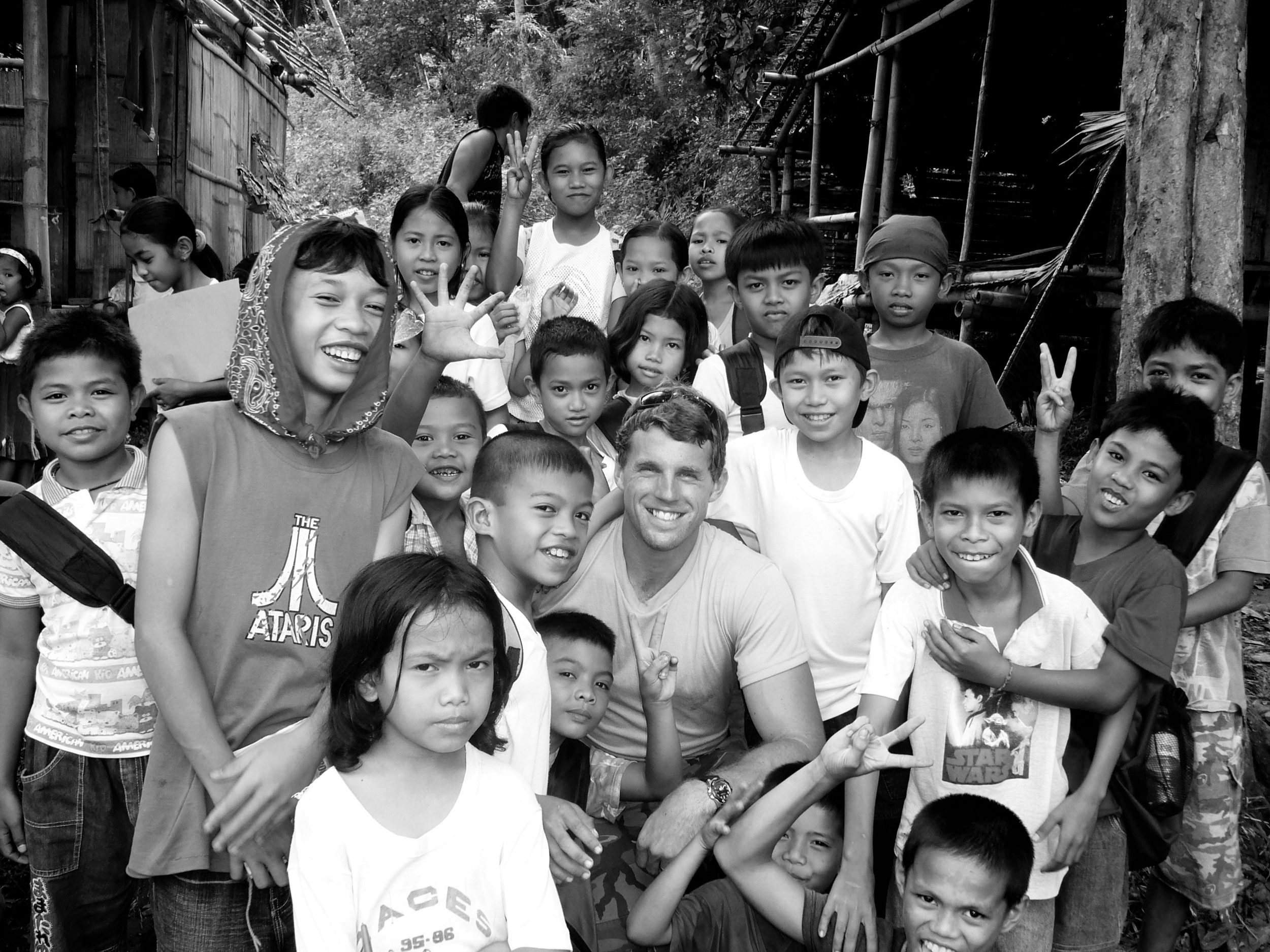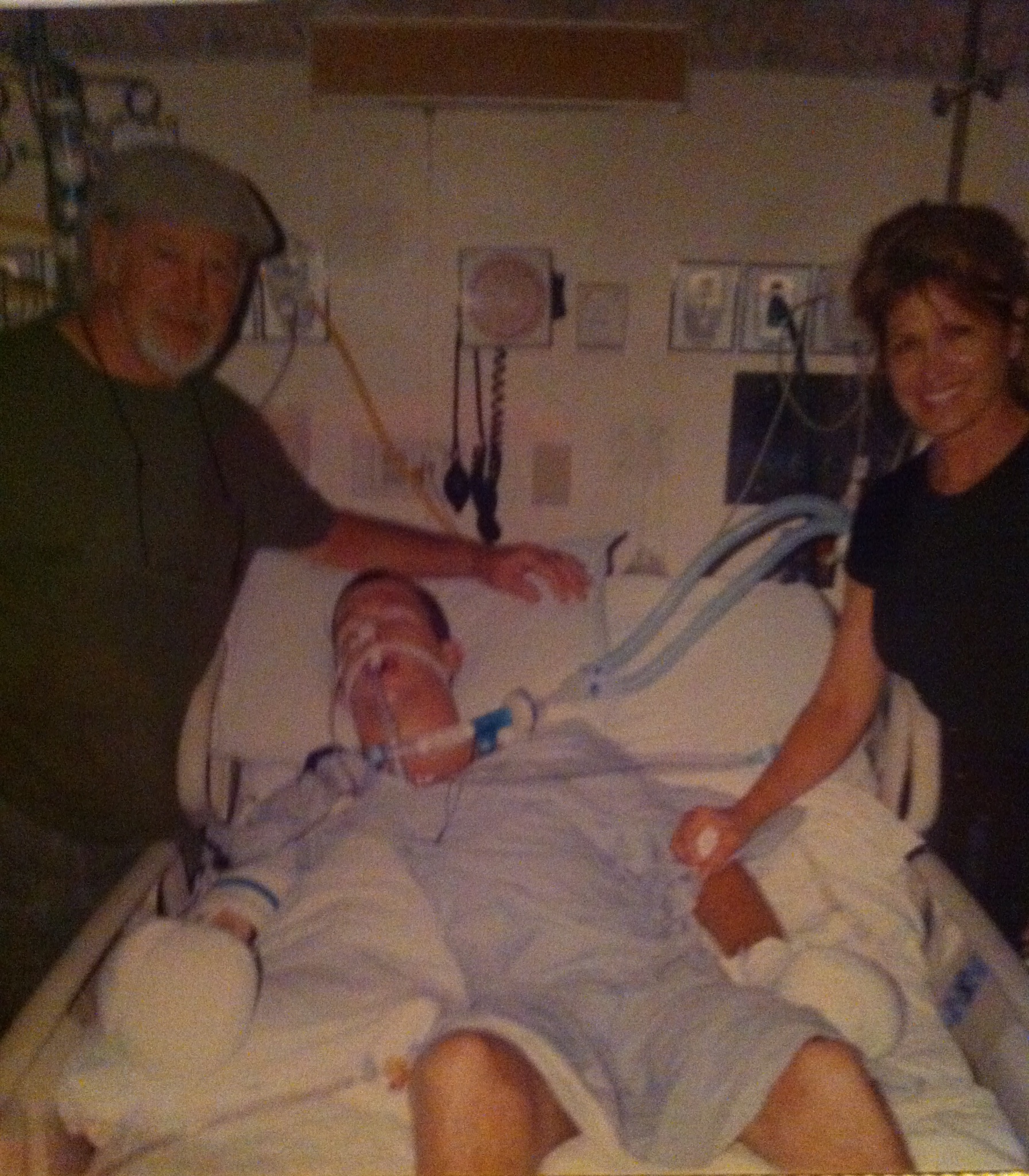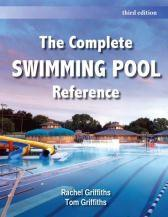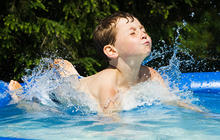 In a recent article in Swimming World Magazine entitled "Resisted and Assisted Pool Training" a warning is issued about SWB.
In a recent article in Swimming World Magazine entitled "Resisted and Assisted Pool Training" a warning is issued about SWB.
Please see the article in it's entirety here.
 In a recent article in Swimming World Magazine entitled "Resisted and Assisted Pool Training" a warning is issued about SWB.
In a recent article in Swimming World Magazine entitled "Resisted and Assisted Pool Training" a warning is issued about SWB.
Please see the article in it's entirety here.
 FORMER USC swimmer Joe Curreri, a Staff Sergeant and Special Forces communications sergeant assigned to the 2nd Battalion, 1st Special Forces Group (Airborne) at Fort Lewis, Wash. died on October 26, 2007, in an accidental drowning incident at Siet Lake while deployed to the Southern Philippines region near Panamao, Jolo Island, Republic of the Philippines. He was 27. He was deployed in support of Operation Enduring Freedom – Philippines. Curreri joined the Army in 2004. This was his first deployment in support of the Global War on Terrorism. Joe’s Team was part of a group helping to train Philippine government troops fighting Islamic militants in the nation's southern islands. Joe was due to return to the United States with his group Nov. 8, 2007.
FORMER USC swimmer Joe Curreri, a Staff Sergeant and Special Forces communications sergeant assigned to the 2nd Battalion, 1st Special Forces Group (Airborne) at Fort Lewis, Wash. died on October 26, 2007, in an accidental drowning incident at Siet Lake while deployed to the Southern Philippines region near Panamao, Jolo Island, Republic of the Philippines. He was 27. He was deployed in support of Operation Enduring Freedom – Philippines. Curreri joined the Army in 2004. This was his first deployment in support of the Global War on Terrorism. Joe’s Team was part of a group helping to train Philippine government troops fighting Islamic militants in the nation's southern islands. Joe was due to return to the United States with his group Nov. 8, 2007.
Joe’s death occurred at the conclusion of an arduous, 11-hour scuba-training mission. A powerful and expert swimmer, he had borrowed a snorkel and flippers and jumped back into Lake Siet to retrieve the USC, Kiros and St. Christopher’s medals that he wore around his neck. Joe had accidentally dropped them in the lake and wanted to retrieve them before his return to the States, since they were special to him. The St. Christopher’s medal was a gift from his grandmother. As he was trying to resurface he suffered from shallow water blackout, faded back down, and drowned. Lake Siet has since been renamed Lake Curreri by the local villagers who loved Joe, especially the local children.

Joseph Francesco Michael Curreri was born September 23, 1980 to Frank and Karen Curreri. Raised in the suburbs of Baltimore, Maryland, he attended Loyola Blakefield High School, where he excelled in American and European history and literature. A four-year varsity letter winner in swimming and three-year Scholastic All-American, he captained the swim team his senior year, 1998, and founded and captained his alma mater’s water polo team.
From August 1998 to May 2002, he attended the University of Southern California in Los Angeles. He earned a Bachelor of Arts degree in History, with a special emphasis on the American Civil War. At USC, he was again a four-year varsity letter winner in swimming, and was elected captain of the Trojans for the 2001-2002 season. Active in student-athlete activities, he served as the Executive Vice President of the USC’s Student-Athlete Academic Council in 2000-2001.
For the next year and a half, he worked as a history tutor, swim coach, and recruiting coordinator for a recruiting agency in El Segundo, California, called Digital Artist Management. He was initially denied entry into the service due to a previous back injury. Joe pled his case to the Army Surgeon General and was granted acceptance into the Army. He went directly to an Army recruiter to apply and sign up for the 18X program.
After completing Basic Training (Distinguished Honor Graduate) and Airborne School in November 2004, he reported to the SOPC course at Fort Bragg. Joe was selected for Special Forces training in January 2005, and completed the Q-Course in December 2006 after studying Chinese-Mandarin at Fort Lewis (DLPT scores: listening, I; reading, 2+;speaking, 2). He attended the Combat Diver Qualification Course from January to February 2007, graduating as the Distinguished Honor Graduate.
Joe was a voracious reader; He enjoyed reading books and periodicals examining history, international affairs, politics, religion, and philosophy. Joe hoped to someday earn a doctorate in history, and spend his latter years teaching our next generation the unique and exceptional history of the United States.
Coaches from Harvard, Yale, Princeton and elsewhere urged Joe to join their swim teams, but he fell in love with USC on a recruiting trip.. He was a dedicated Trojan.
His Army buddies, some from competing colleges around the country, recounted how he would devilishly subject them to his singing of the USC fight song.
Among his swimming career highlights were a 1999 Pac-10 Championships finals appearance in the 200y back (finishing eighth) and a 2000 U.S. Olympic Trials appearance in the 400m IM). He was also part of USC's first-place 1999 U.S. Spring National 800m free relay. Curreri was named to the Pac-10's All-Academic second team in 2000 and 2001 and earned the team's Josh Ilika Spirit Award those years. The Josh Ilika Spirit Award has since been renamed the Joseph Curreri Spirit Award. Joe’s dear friend Josh Ilika made the change. Curreri's military education include the Warrior Leader Course, Basic Noncommissioned Officer Course, Basic Airborne Course; Survival, Evasion, Resistance, and Escape Course; Special Forces Qualification Course, and the Combat Diver Qualification Course. His awards and decorations include the Army Achievement Medal, National Defense Service Medal, Global War on Terrorism Service Medal, Noncommissioned Officer Professional Development Ribbon, Army Service Ribbon, Parachutist Badge, Special Forces Tab, and the Special Operations Divers Badge. He was posthumously awarded the Global War on Terror Expeditionary Medal, Army Commendation Medal, and Meritorious Service Medal
In an essay titled "Why I wish to become a Green Beret," Curreri quoted President Kennedy about the few granted the role of defending freedom in the hour of maximum danger.
"When my children ask me what I did to avenge the assault of September 11th, I shall be able to look them in the eye, without a hint of hesitation, and respond that I answered the call of our nation," he wrote.
In addition to his widow Athena Wickham of Los Angeles and his mother, Karen of Newport Beach, Curreri is survived by his father, Frank, of Carney, MD.; his stepmother, Tricia; and two sisters, Shannon Trevino of Laguna Beach and Angelina Curreri of Carney, MD.
The family asks that any donations be made to the Special Operations Warrior Foundation -- which provides scholarships and counseling to children of fallen military personnel.
 Darren Harrity, Helicopter Rescue Swimmer, US Coast Guard
Darren Harrity, Helicopter Rescue Swimmer, US Coast Guard
*Special thanks to Darren for telling his story.
Being from South Florida I grew up as an avid surfer, swimmer and spear fishermen. I fell in love with the water. At age 19 during my second year of college at FAU I began thinking about joining the Coast Guard to be a helicopter rescue swimmer. Regularly I would go to the FAU college pool and train towards that dream. The rescue swimmer program requires immense underwater confidence so at the pool I would practice underwater work, this is how my shallow water black out occurred. My incident occurred on April 29, 2007 at the college olympic sized pool. Since I have no memory of that day, according to a text I sent a friend prior to going to the pool , I detailed my workout. Along with a normal swim workout, I had planned eight 50 meter under water laps with no breath, then 60 seconds treading water between laps for rest. I woke up in the hospital 5 days later. I had experienced a shallow water blackout on one of my 50 meters underwater no breath. According to the police report I was laying at the bottom of the pool when a master swimmer who was in the lane next to me realized something was wrong and pulled me out. The lifeguard came over and felt no pulse, and gave me two cycles of CPR. They were then able to feel a weak pulse. I was rushed to the hospital where they kept me in an induced coma for 5 days. My lungs where full of water and according to my parents, my neck had swollen up like an inner tube. I was put on a medical ventilator while in the coma. They performed brain scans to find any damage that may have occurred. The police report stated I was underwater anywhere from 2-4 minutes. When the scans showed no sign of brain damage they woke me from the coma. I then spent another 5 days in the hospital.

After being released from the hospital my recovery still had a long way to go. I had developed a blood clot in my arm and I now weighed only a mere 125 pounds. A lot had to be taken care of before I could go back to my normal and active way of life. I was thankful to be alive, but my dream of joining the coast guard looked grim. When I was finally able to work out and go for a run I got full body cramps but I stayed positive and worked hard. I knew I couldn't let this trauma keep me from my dream. A year later I joined the coast guard. 4 years after that I accomplished my dream and graduated with honors as a Helicopter rescue swimmer for the U S Coast Guard.
NEW! The Complete Swimming Pool Reference, 3rd edition

Designed as a single, definitive reference on swimming pool safety and management, this book includes important chapters on first aid, lifeguarding, pool maintenance, as well as a unique hot tub and spa section. This comprehensive book is a valuable resource for all those who own, operate or otherwise work at swimming pools, including swimming pool managers and technicians, university and college instructors, municipal/semi-public pool operators, lifeguards, swim coaches, and private pool owners.
"The pool business is a tough, comprehensive subject and Tom Griffiths has done a masterful job at tackling all the issues." --Amazon Review
Please click here to purchase!
We are grieved to report yet another life has been lost this month to SWB. 27 year old Benjo Haller died on August 1 at the age of 27 in seven feet of water, off the shore of Eleuthera Island, Bahamas. His death occurred while doing underwater breath holding drills to increase his time for spear fishing. Benjo was a dynamic young man who was an avid sailor and a certified SCUBA instructor. His father, Dean Haller, has been added to our board of advisors and is actively seeking to educate people on the dangers of shallow water blackout. Please see Benjo's full memorial below, as told by his father Dean.

Benjamin Craig (Benjo) Haller died on August 1, 2014 at the age of 27 in seven feet of water off the shore of Eleuthera Island, Bahamas. His death occurred while doing underwater breath holding drills to increase his time under water for spear fishing. As was so often the case with Benjo he was attempting to exceed his previous best at yet another personal challenge.
After his sixth grade Benjo was enrolled in sailing lessons at The International Sailing Center in Mallets Bay, Vermont. He went on to work there every summer until the beginning of the summer of 2014. During this time, he became an incredibly accomplished sailor, instructor, technician and boat repairman.
In 2002, the family acquired a damaged 30 foot O'Day sailboat, which Benjo fully restored over the course of the next several summers. He delighted in giving his friends moonlight cruises or teaching them how to sail on Momma Dance. After graduation from high school, Benjo attended the Pro Dive SCUBA Training Center in Fort Lauderdale, Fla., and became a certified SCUBA Instructor. Upon certification, he was immediately hired by the internationally acclaimed Stuart Cove's Dive Center in Nassau, Bahamas, and was the youngest instructor ever hired by the Center.
After working at the Dive Center for a year, Benjo enrolled at the University of Colorado, Boulder; Alpine skiing was everywhere, but sailing was non-existent. Over the course of the next five years, he worked tirelessly to create The Boulder Sailing Club and to have it sanctioned and financially supported in part by the University. Using countless fundraising events, traveling throughout the west picking up donated sailboats and securing the rights to use the Boulder Reservoir, his dream came true. By the time he graduated with a degree in Film, the University was racing collegiately throughout the west.
At the age of 12 while diving in Cozumel with his family, he set his mental sexton on sailing from Vermont to the Caribbean. In October 2013 he left Mallets Bay in northern Vermont on Momma Dance, after a year of planning and charting his course, provisioning the boat, and lining up mates to meet him along the way. He made it to Norfolk in 21 days and left his boat there for the winter. In May of this year he flew to Norfolk, picked up Momma Dance, and on July 18, 2014 he landed on Bimini Island in the Bahamas from there he sailed to the Eleuthera Islands His goal was to tour the Islands in the Bahamas with his First Mate, Matt, and Buddy, his beloved dog that sailed with him from Vermont. Ben's long ago dream came true! His next plan was to head to the southern Caribbean to work as a sailing and SCUBA instructor. Regrettably, his next adventure was tragically denied on Aug. 1, 2014.
With an infectious laugh, a diamond studded smile, the good looks of a movie star, and the zest to fill every single minute of his life with adventure and personal challenges; he became a magnet for those wanting to experience life as he defined it. When he was on the water, either liquid or frozen, he was in his element or the world was his oyster.
http://www.legacy.com/obituaries/burlingtonfreepress/obituary.aspx?pid=172053389
 CBS Morning News discusses different causes of drowning, shallow water blackout.
CBS Morning News discusses different causes of drowning, shallow water blackout.
http://www.cbsnews.com/news/little-known-swimming-safety-risks/
 via http://www.noozhawk.com/
News of the death of 20-year-old local swimmer Nicholas Johnson shocked the community when it occurred in March, and the Santa Barbara County coroner released a report this week stating he believes the cause of the young man's death to be shallow water blackout, a condition that can cause swimmers to go unconscious underwater. Johnson, a sophomore at UCSB and a competitor on its men's water polo team, was found unresponsive at the bottom of the Santa Barbara High School swimming pool on March 24, but efforts to revive him, at the poolside and later at the hospital, were unsuccessful. More...
via http://www.noozhawk.com/
News of the death of 20-year-old local swimmer Nicholas Johnson shocked the community when it occurred in March, and the Santa Barbara County coroner released a report this week stating he believes the cause of the young man's death to be shallow water blackout, a condition that can cause swimmers to go unconscious underwater. Johnson, a sophomore at UCSB and a competitor on its men's water polo team, was found unresponsive at the bottom of the Santa Barbara High School swimming pool on March 24, but efforts to revive him, at the poolside and later at the hospital, were unsuccessful. More...
 A question via Twitter, from @ConcernedMom9:
A question via Twitter, from @ConcernedMom9:
"Any thoughts on this article: '3 Ways to Improve Your Breath Control?'"
Thank you for your question! Here are some thoughts from Dr. Rhonda Milner.
In response to Nick Folker's article in Swim Swam on ways to improve breath-holding, I am excited to see the swim community recognizing the real risk of Shallow Water Blackout to swimmers, especially competitive swimmers with this waring:
*Note: swimming as a sport is becoming increasingly aware of the risks of shallow water blackout. Never practice any sort of breath-holding sets alone, and be aware of the risks of hyperventilation and breath-holding before undertaking any sets of this nature. While the risks of 25-yard underwater swimming are generally fairly low for competitive swimmers, those risks do still exist, and risks exist with any and all forms of strenuous activity. See more about the risks of “hypoxic training” on page 26 of the USA Swimming Safety/Loss Control Manual.
But, can hypoxic training ever be completely safe except for on dry land? Is safe hypoxic training an oxymoron? However, with safety guidelines it can be as safe as possible, but not 100%. Here are a few quick bullet points to remember that will help prevent SWB. --Never hyperventilate (can still have SWB without intentional hyperventilation) --Never ignore urge to breathe --Never swim alone --Breath-holding is not a game and is dangerous --If you Breath-hold, don't think the lifeguards will save you BC difficult to detect --Lastly, if you breath-hold--the Rule: one lap, one time, one breath, But if you have a genetic trigger you still can drown. **the most dangerous situation is repetitive, competitive, prolonged breath-holding laps with little rest in between **Breath control is needed to learn to swim and swim fast, but must be supervised and the urge to breathe must never be ignored. Please swim safely and have fun!! Thank you, Rhonda Milner, MD Founder and Chairman of Shallow Water Blackout Prevention

We are sad to report another case of possible shallow water blackout - and adults unaware that children were drowning right before their eyes. During this season of summer PLEASE educate yourselves, friends and loved ones on the dangers of breath-holding games among children. Please view this story here.